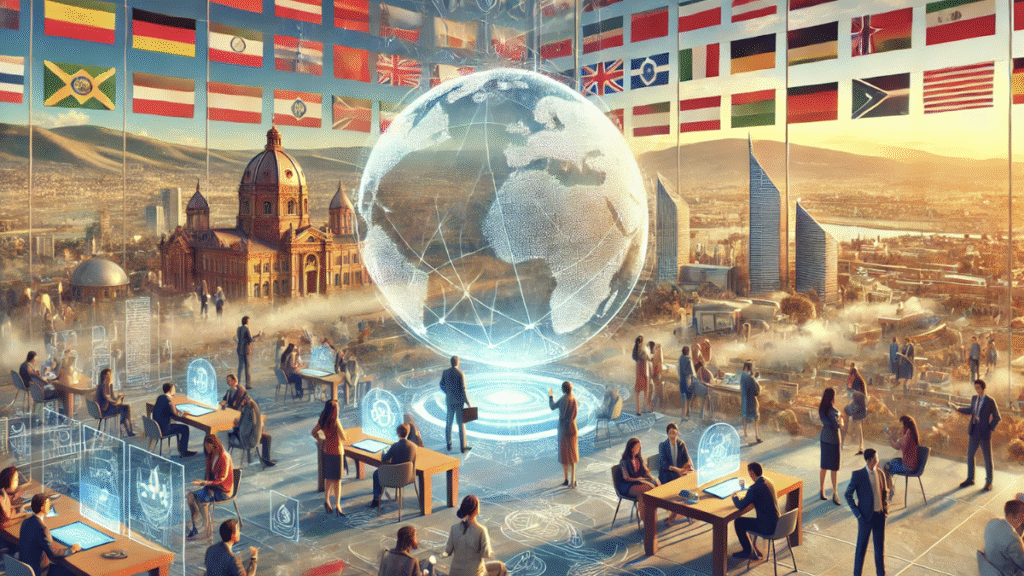
Summary – As artificial intelligence reshapes global power dynamics, nations accelerate diplomatic and regulatory efforts to manage its impact.,
Article –
Artificial Intelligence (AI) has become a transformative force influencing geopolitics, economics, climate, and social structures worldwide. Recently, there has been unprecedented diplomatic activity focused on creating governance frameworks for AI development and deployment, highlighting its strategic significance on the global agenda. This global collaboration marks a crucial shift in how nations address technology, security, economic competitiveness, and ethical governance.
Background
The surge in global AI diplomacy began in early 2025 after rapid advancements in AI capabilities were demonstrated by top technology firms and national research organizations. Nations recognized that AI’s influence extends beyond domestic advantages to affect international stability, cybersecurity, and economic landscapes. Consequently, multilateral organizations like the United Nations (UN) and regional alliances such as the European Union (EU) held special sessions focusing on AI regulation.
The key players include:
- United States: Prioritizes innovation protection while advocating for ethical AI standards.
- European Union: Pushes for stringent regulations to safeguard privacy and human rights.
- China: Balances state control with encouraging AI innovation, promoting “digital sovereignty.”
- Japan: Emphasizes international collaboration and human-centric AI development.
The Global Impact
AI’s economic impact drives much of this diplomatic momentum. Its ability to disrupt labor markets, productivity, and supply chains means economies advanced in AI can gain significant competitive edges, potentially widening the gap between developed and developing countries. There is pressure for international coordination to manage these disparities and ensure benefits are inclusive.
Geopolitically, AI exacerbates tensions as nations compete for dominance in civilian and military domains. Concerns about autonomous weapons and AI-powered cyber warfare have increased efforts to establish norms analogous to nuclear non-proliferation treaties. Additionally, AI’s capacity to influence public opinion through information spread presents challenges to democratic processes globally.
Reactions from the World Stage
Responses vary depending on national interests and alliances:
- The UN Secretary-General calls for a global AI governance system emphasizing transparency, accountability, and human rights.
- The EU is advancing the Artificial Intelligence Act, aiming for binding regulatory rules.
- Emerging economies warn that excessive regulations might hinder development and increase dependency.
- China advocates for “digital sovereignty” alongside multilateral engagement to prevent conflict and misuse.
Experts view this diplomatic initiative as a move away from fragmented approaches toward a growing consensus on the importance of AI. Nonetheless, balancing innovation, security, ethics, and economic interests across diverse political systems remains challenging.
What Comes Next?
The future of global AI diplomacy depends on states’ ability to reconcile competing priorities and build mutual trust. Upcoming G20 summits and international forums on emerging technologies will continue this dialogue.
Potential advances include:
- Development of standardized norms and enforceable agreements to reduce risks such as military escalation and economic disruptions.
- Creation of adaptive regulations keeping pace with AI innovation.
- Ensuring inclusivity so AI benefits are shared equitably and vulnerable groups are protected.
- Integration of environmental concerns addressing the climate impact of large-scale AI infrastructure.
In summary, this wave of AI-driven diplomacy marks a transformative moment in global governance. Stakeholders face the dual challenge of harnessing AI’s potential while mitigating its risks within a complex international landscape. As geopolitical competition intensifies, the question remains whether the world can establish a sustainable and ethical framework for AI.

